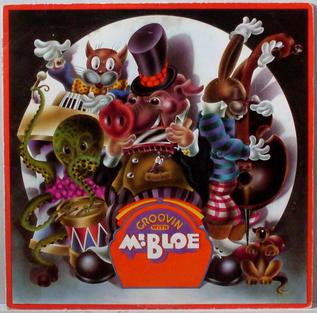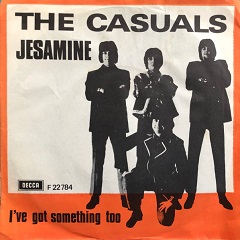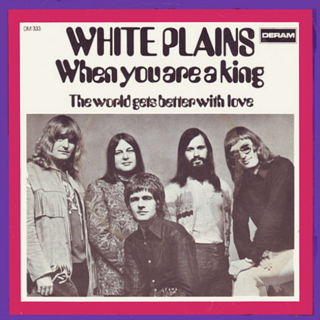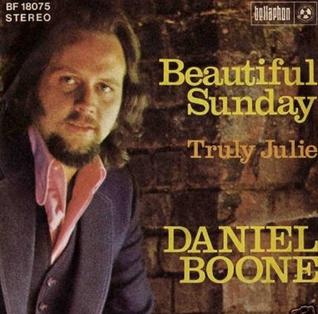Bubblegum is rock and pop music in a catchy and upbeat style that is marketed for children and adolescents. The term also refers to a more specific rock and pop subgenre, originating in the United States in the late 1960s, that evolved from garage rock, novelty songs, and the Brill Building sound, and which was also defined by its target demographic of preteens and young teenagers. The Archies' 1969 hit "Sugar, Sugar" was a representative example that led to cartoon rock, a short-lived trend of Saturday-morning cartoon series that heavily featured pop rock songs in the bubblegum vein.

"Love Grows (Where My Rosemary Goes)" is the debut single by Edison Lighthouse. The song reached the number one spot on the UK Singles Chart on the week ending 31 January 1970, where it remained for a total of five weeks. It also became the first number one single of the 1970s (not counting Rolf Harris's "Two Little Boys" which was a holdover from 1969).

Mr. Bloe was the name given to the musicians who performed the single "Groovin' with Mr. Bloe", which was a hit in 1970 in the UK for Dick James Music (DJM). These included Harry Pitch on harmonica, and Zack Laurence on piano.
Geoffrey Stanton "Geoff" Morrow is a British songwriter and businessman. His compositions have been recorded by Butterscotch, Sandie Shaw, the Carpenters, Elvis Presley, Johnny Mathis, Jessie J, Barry Manilow and many other musicians.

"United We Stand" is a song written by Tony Hiller and Peter Simons. It was first released in 1970 by the Brotherhood of Man in their original, pre-Eurovision line-up, consisting of Goodison, Tony Burrows, Roger Greenaway, Sue Glover and Sunny Leslie. It became the band's first hit, peaking at #13 in the U.S., #9 in Canada, and #10 in the U.K. The song spent 15 weeks on the charts, and is ranked as the 64th biggest U.S. hit of 1970. It also reached #8 in Australia.
"Perfect Moment" is a song originally by Polish singer Edyta Górniak from her first international album, Edyta Górniak (1997). It was written by Jim Marr and Wendy Page and produced by Christopher Neil. A cover by British singer and actress Martine McCutcheon reached number one on the UK Singles Chart in 1999.

"Jesamine" is a song written by Marty Wilde and Ronnie Scott, published under the pseudonyms Frere Manston and Jack Gellar. Initially recorded by Welsh band the Bystanders as "When Jezamine Goes", a version by English band the Casuals became a hit when it was released as a single in August 1968. It reached number two on the UK Singles Chart in October 1968.

"Beach Baby" is a song by the British band The First Class. Written by John Carter and his wife, Gillian (Jill) Shakespeare, the song became the band's only substantial hit. The subject of the lyrics is not holiday love, but a broken love relationship between two high school students in Los Angeles in the 1950s.

"Gimme Dat Ding" is a 1970 popular UK song, of the novelty type, sung by "one-hit wonder" The Pipkins, and written and composed by Albert Hammond and Mike Hazlewood. Released as a single, it is the title selection of an album which The Pipkins recorded and released on the EMI Columbia Records label. It also appeared on a compilation album of the same name, which The Pipkins shared with another up-and-coming UK group, The Sweet. It has also been included on many other compilation albums. "Gimme Dat Ding" was arranged by Big Jim Sullivan.
"Now Is the Time" is a pop song written in 1976 by Biddu. It was recorded that year by Jimmy James and the Vagabonds. The track appeared in the Top 10 of the UK Singles Chart.

"Hello Stranger" is a 1963 hit single by Barbara Lewis that spent two weeks at number one on the R&B singles chart in Billboard, crossing over to #3 on the pop chart.

"That Same Old Feeling" is the title of a pop song composed by John Macleod and Tony Macaulay which in 1970 was a Top Ten UK hit for Pickettywitch, an English band fronted by Polly Brown. In the US the Pickettywitch single vied with a rival version by The Fortunes, with both versions scoring well-enough regionally to reach the Top 70 of the Hot 100, the national hit parade maintained by Billboard magazine.

"When You Are a King" is a 1971 pop song by British band White Plains. It was written by John and Roger Hill, in contrast to most White Plains songs that were written by Roger Cook and Roger Greenaway. Roger Greenaway did produce the song.

"Beautiful Sunday" is a song written by Daniel Boone and Rod McQueen and performed by Boone. It appeared on his 1972 album Beautiful Sunday and was produced by Larry Page and arranged by Boone.

"Freedom Come, Freedom Go" is a pop song by The Fortunes. It was the third of three releases from their That Same Old Feeling album, and saw the band revive their fortunes by working in a Britgum idiom.

Already is the debut album by British band Edison Lighthouse, released in 1971. It features three singles: both "Love Grows " and "It's Up to You Petula" became chart hits in the UK, US, Canada and New Zealand, while the third, "What's Happening", became a regional hit in Australia.
Butterscotch were an English soft rock band which consisted of Chris Arnold, David Martin and Geoff Morrow, who are also known collectively as the songwriting and record production trio Arnold, Martin and Morrow. They are best known for their top 20 UK and Ireland hit, "Don't You Know ".

"Rainbow" is a song by Scottish rock band the Marmalade, released as a single in June 1970. It peaked at number 3 on the UK Singles Chart.
"Funny, Funny" is a song by British band the Sweet released in January 1971. It was the first single from their debut album Funny How Sweet Co-Co Can Be and became their first chart hit, peaking at number 13 on the UK Singles Chart.
"The Banner Man" is a 1971 song by the British pop band Blue Mink. The song managed to reach the top ten on the UK charts peaking at #3 in May 1971. It was released as a single with the B-side "Mind Your Business". The single was written by Blue Mink founders Roger Cook and Roger Greenaway.













